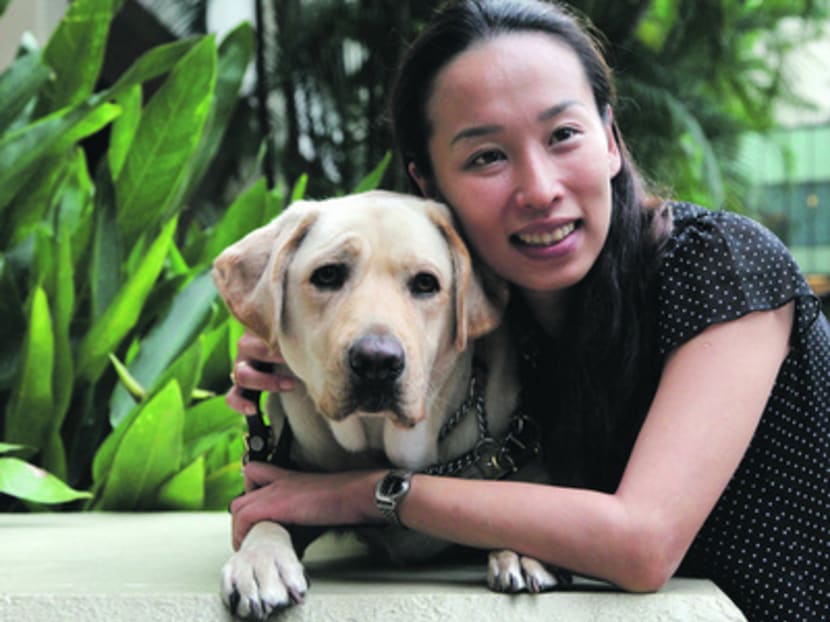Public education on guide dogs ‘needs to be ramped up’
SINGAPORE — It has been two years since Esme the guide dog arrived in Singapore to help her blind handler Cassandra Chiu navigate Singapore’s streets and buildings, but the duo are still regularly turned away at restaurants and retail stores.

Ms Cassandra Chiu, with her guide dog Esme, said she was once rejected from a sales position when interviewers realised she was blind. Photo: Don Wong
SINGAPORE — It has been two years since Esme the guide dog arrived in Singapore to help her blind handler Cassandra Chiu navigate Singapore’s streets and buildings, but the duo are still regularly turned away at restaurants and retail stores.
Last Sunday, ice-cream chain Haagen-Dazs refused Ms Chiu and her dog indoor seating, even though she presented the manager with a photo identity card supported by the Ministry of Social and Family Development to allow guide dogs into public places.
Describing the incident on Esme’s Facebook page, Ms Chiu said the cafe staff repeatedly told her no pets were allowed, even though she had explained that Esme was not a pet but a working dog to assist the blind. The group eventually left.
Pets and animals are not allowed into food outlets unless the establishment is licensed to do so, but guide dogs are exempted from the rule.
The Islamic Religious Council of Singapore also states that halal-certified eateries can allow guide dogs on their premises.
Contacted yesterday, Ms Chiu said a staff member from Haagen-Dazs had called to apologise.
“I had explained many times that this is not a pet — this is a guide dog and I need it as I am blind. At the end of the day, it is not about Haagen-Dazs or any particular merchant. It’s about my basic right to go about doing normal day-to-day activities.”
Although rules are on her side, it is still “down to the people on the ground” to permit them entry. “On a daily basis, I suffer rejections at least once or twice, mostly at eating places, including coffee shops,” said Ms Chiu, who added that this problem has pushed her to turn to shopping online instead of at stores. Public transport was once a major problem but the situation has since improved, although taxis still remain an issue, she added.
Responding to media queries, Haagen-Dazs’ Managing Director for Asian Markets Wuthichai Ratanasumawongs said: “We sincerely apologise for this mistake in judgment made by our shop staff. It was wrong, and we are taking steps to ensure that this does not happen again. While we are taking steps, we need some more time to investigate and finalise the action steps. Once again, our sincere apologies to all.”
Dr Francis Seow-Choen, Chairman of the Guide Dogs Association of the Blind, said businesses’ concerns include the fear that giving guide dogs entry is against government regulations, that the dogs may offend Muslim customers, or that the animals may urinate or defecate on the premises.
He gave the assurance that guide dogs are well-disciplined. “They pee or poop only on command. They are trained not to bark, and not to be distracted by other humans, cats, rats or small animals. They also don’t go around sniffing people.” He added that public education on guide dogs needs to be ramped up, as there are plans to bring in more of them in future.
Singapore welcomed its first guide dog in 2005, followed by Esme in 2011, and a third last year. TAN WEIZHEN






